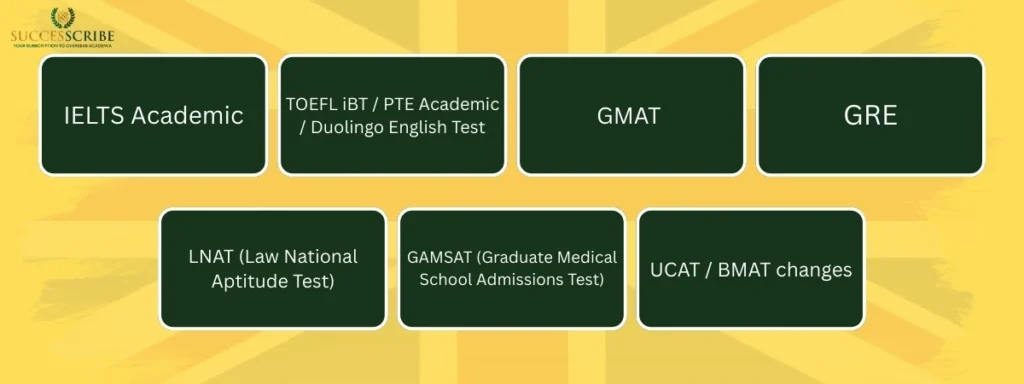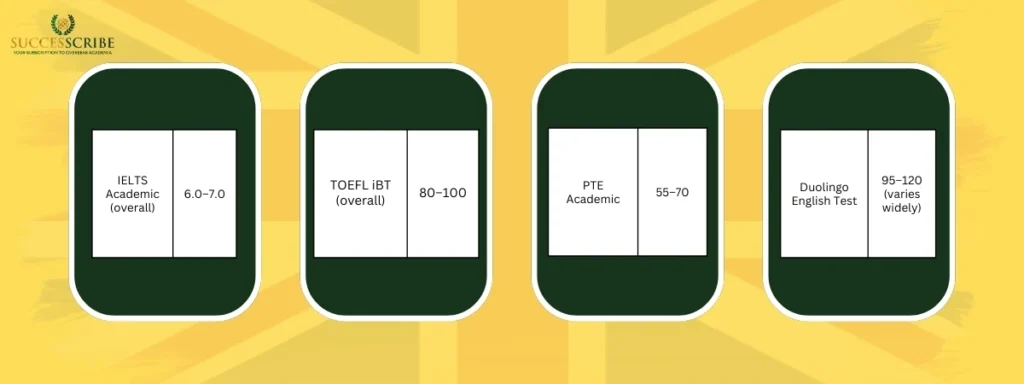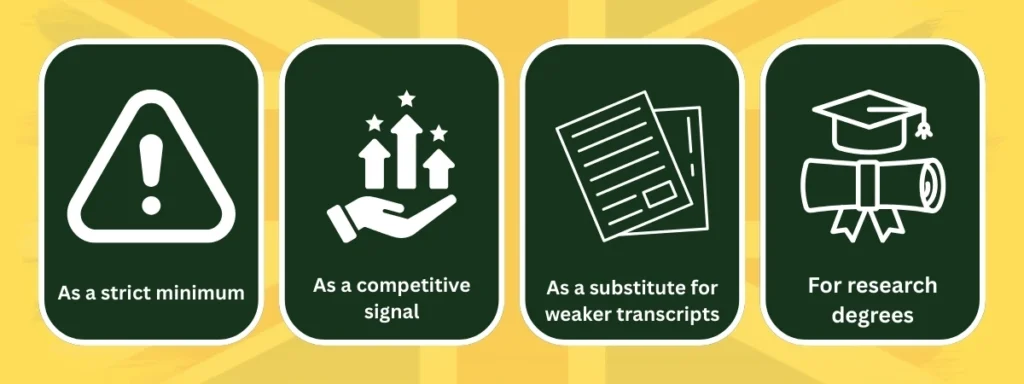The UK higher education sector is a magnet for international talent. According to the Higher Education Statistics Agency (HESA), in the 2021/22 academic year, there were 713,000 postgraduate students in the UK, with 51% of all postgraduate students originating from outside the UK. This vibrant, competitive environment means universities need robust methods to select the most capable candidates. Entrance Exam for Masters in UK are an essential step for many international students, helping universities fairly assess candidates from diverse educational backgrounds.
Not every Master’s programme requires a specific entrance exam. Many humanities, social science, and science courses assess candidates based on their undergraduate degree classification, statement of purpose (SOP), letters of recommendation (LORs), and relevant experience. However, for highly specialised and competitive fields like Business, Law, and Medicine, standardised tests are the norm. They provide admissions tutors with a standardised metric to compare applicants from diverse educational backgrounds across the globe.
Latest Changes & Updates in UK Entrance Exams
- BMAT discontinued: The Biomedical Admissions Test (BMAT) was officially discontinued after 2024. Most UK medical schools now rely on UCAT or GAMSAT.
- GMAT Focus Edition: From 2024 onwards, the GMAT Focus Edition replaced the older GMAT exam. It is shorter (2 hrs 15 mins) and scored from 205–805 instead of 200–800.
- GRE Shorter Version: Introduced globally in late 2023, now only 1 hr 58 mins instead of 3 hrs 45 mins, making it more accessible for UK-bound students.
- LanguageCert SELT Changes: The UK Home Office updated its Secure English Language Test (SELT) list. Always cross-check the gov.uk SELT page before booking.
Why Entrance Exam for Masters in UK is Still Relevant
Despite holistic admission reviews, Entrance Exam for Masters in UK remains important because it provides universities with a standard benchmark to compare applicants globally. Getting into a UK master’s programme in 2025 usually requires two layers of proof: (A) academic background (undergraduate degree, transcripts, references) and (B) assessment evidence – standardized tests that universities use to compare applicants worldwide. Those assessments fall into three broad groups:
- English language tests (IELTS, TOEFL, PTE Academic, Duolingo etc.) – mandatory in almost all cases for international applicants whose previous education was not in English, and often mandatory for the Student visa (UKVI) process.
- General graduate tests (GMAT, GRE) – commonly used by business, management, data-science, engineering and some research programmes.
- Subject- or profession-specific admissions tests (e.g., LNAT for law, GAMSAT/UCAT for graduate medicine or clinical entry) – used by specific faculties to assess aptitude for a subject.
Why this matters: UK universities receive thousands of global applicants. Tests provide common, comparable data points that help selection panels decide who to interview and who to offer. However, tests rarely operate in isolation – they are one part of a holistic decision (references, statement, work experience, research proposal, interview).
Entrance Exam for Masters in UK – The main tests you should know about

Not every master’s programme requires standardized tests – many humanities and taught social science master’s rely primarily on transcripts, references and a personal statement. Always check the programme page for the exact requirement.
| Test family | Typical purpose for master’s entry | Who commonly asks for it |
| IELTS Academic / IELTS Academic UKVI | Prove English language ability for study & visa | Almost every UK university (or accepted alternatives) |
| TOEFL iBT / PTE Academic / Duolingo English Test | Alternatives to IELTS for English proof | Many UK universities accept these as equivalent to IELTS |
| GMAT | Business / management / some data/analytics master’s (MBA, MiM, MSc Finance) | Top business schools (LBS, Cass/City, Imperial, Warwick, Manchester, etc.) -score expectations vary. |
| GRE General Test | STEM, social science, research master’s; increasingly accepted for some business programmes too | Select departments at Russell Group and research-led institutions. |
| LNAT (Law National Aptitude Test) | Law aptitude for LLM/graduate law entry to some universities | Oxford, UCL, LSE, Bristol, Durham, KCL, many others (check programme). |
| GAMSAT (Graduate Medical School Admissions Test) | Graduate-entry medicine programmes | Universities that run graduate medicine courses; dates and windows set by ACER. |
| UCAT / BMAT changes | Clinical/medicine admissions – UCAT is now dominant for many med schools after BMAT discontinuation | Medical schools: UCAT (growing use), note BMAT was discontinued and replaced/changed recently. |
English language proof & UKVI rules (what you must know)

Almost every university requires proof of English ability, making language-based Entrance Exam for Masters in UK one of the most common requirements for international students. If you need a UK Student visa, you may have to demonstrate your English ability through a Home Office-approved Secure English Language Test (SELT) or other accepted evidence. The Home Office and universities closely track which SELT providers are approved and any changes – for example, changes to LanguageCert provision from Jan 1, 2025 were published by the UK government.
Typical Score Expectation
Universities set different minimums depending on level and competitiveness. Here are typical ranges you’ll see for taught master’s offers:
| Test | Typical minimum for a taught master’s (common range) | More competitive programmes |
| IELTS Academic (overall) | 6.0–7.0 | 6.5 or 7.0 overall with minimum sub-scores 6.0–6.5 (for highly ranked STEM/management programmes often 7.0). |
| TOEFL iBT (overall) | 80–100 | 92–110 (top universities may ask ≥100) |
| PTE Academic | 55–70 | 67–76 |
| Duolingo English Test | 95–120 (varies widely) | Some unis allow it but check the programme |
GRE & GMAT
Entrance exams like GRE and GMAT continue to play a crucial role in UK master’s admissions, especially for business schools, quantitative programmes, and research-based tracks. While many universities waive test requirements, top-ranked programmes still rely on these exams to benchmark applicants globally. For competitive business and STEM programmes, GRE and GMAT stand out as the most recognized Entrance Exam for Masters in UK, particularly at Russell Group and top business schools
| Aspect | GRE (Graduate Record Examination) | GMAT (Graduate Management Admission Test |
| Where it applies | – STEM fields (Computer Science, Data Science, Engineering, Mathematics)- Social Sciences (Economics, Psychology, International Relations)- Research-based Master’s & MPhil leading to PhD- Increasingly accepted by some UK business schools as GMAT alternative | – MBA (Master of Business Administration)- MSc Finance, MSc Accounting, MSc Management- MiM (Master in Management)- MSc Business Analytics, MSc Marketing- Executive MBA (some cases) |
| Universities in UK commonly asking/accepting | – London School of Economics (Economics & Finance)- Imperial College London (Data Science, Engineering)- University College London (Computer Science)- University of Oxford (Economics, PPE-related MPhil)- University of Cambridge (Engineering, Economics)- University of Warwick (Quantitative programmes)- Many Russell Group universities accept GRE in place of GMAT for business tracks | – London Business School (LBS)- University of Cambridge Judge Business School- University of Oxford Saïd Business School- Imperial College Business School- Alliance Manchester Business School- Warwick Business School- City, University of London (Bayes Business School)- Durham University Business School |
| Structure (Latest Version) | – Verbal Reasoning: 130–170 (1-point increments)– Quantitative Reasoning: 130–170 (1-point increments)– Analytical Writing: 0–6 (0.5-point increments)New shorter GRE takes 1 hr 58 mins | – GMAT Focus: 3 sections – Quantitative Reasoning, Verbal Reasoning, Data Insights– Scores: 205–805 (in 10-point increments)– Duration: 2 hrs 15 mins |
| Score guidance (general UK benchmarks) | – Average competitive Quant score: 160+ (80th percentile)- Average competitive Verbal score: 155+- Top programmes expect: 320–330 total (out of 340)- Analytical Writing: 4.0+ | – Average competitive GMAT: 600–650- Top business schools average: 650–700+- LBS class average: ~700- Oxford Saïd MBA middle 80% range: 600–780- Warwick MBA average: 630+ |
| Validity period | 5 years | 5 years |
| Cost (2025 global average) | £175 | £220 |
| Retake policy | – Used as proof of quantitative/verbal readiness- Strong GRE can offset average undergrad record- Helpful for scholarships (esp. STEM/data-heavy tracks)- May be “optional but recommended” at many unis | – Used as a core selection tool for MBA/MiM- High GMAT improves chances for scholarships- Employers/recruiters familiar with GMAT gives weight in post-MBA job market |
| Strategy tips | – Target 320+ for top 10 UK unis- Focus on Quant if applying to STEM/data tracks- Use ETS official practice & timed mock tests | – Target 650+ to be competitive, 700+ for top 5 schools- Strengthen weak areas (Data Insights is new in GMAT Focus)- Combine with strong work experience & essays |
Subject-specific admissions tests (LNAT, GAMSAT, UCAT etc.)
Some master’s or graduate professional entry programmes require discipline-specific assessments. Below is a practical mapping.
| Subject/programme | Common test(s) | Who / notes |
| Law (LLM, conversion routes to law) | LNAT | Used by many major UK law schools for both UG and some postgraduate placements; LNAT tests comprehension, reasoning and a written section. Always check whether your LLM or conversion course requires LNAT. |
| Graduate-entry medicine (GEM) | GAMSAT (historically BMAT; UCAT for some routes) | GAMSAT is the established exam for many graduate medicine routes (ACER administers it) and has specific windows and score validity rules. Note that BMAT administration changed and many med schools now use UCAT/other arrangements – check current med-school policies. |
| Clinical / undergraduate medicine / some graduate clinical entry | UCAT (and previously BMAT) | UCAT is widely used by many UK medical schools; BMAT has been discontinued or phased out from CAAT in recent years, so applicants must check the latest admissions test list. |
| Other professional tests (special cases) | Example: university-specific mathematics/aptitude tests, portfolio reviews, auditions | Examples: some Oxford/Cambridge programmes have pre-interview tests or analytical assessments – check the specific department page. |
How Entrance Exam for Masters in UK Scores Are Used by Universities

Universities use scores differently by faculty and by programme:
- As a strict minimum: Some programmes have cutoffs (e.g., IELTS overall 6.5 with no element below 6.0). If you fall below the minimum, you will normally not be offered.
- As a competitive signal: For scholarships, competitive streams or shortlisting to interview rounds (especially for MBA/MSc Finance), schools look at percentile and cohort averages. For example, top UK business schools publish guidance on the GMAT/GRE levels they typically see; they remind applicants that scores are one component among many.
- As a substitute for weaker transcripts: An above-average test score can sometimes strengthen an application from a less familiar university or from a candidate with a non-linear background.
- For research degrees: GRE (or good undergraduate marks plus research outputs) may be influential when supervisors compare candidates for funded PhD or MPhil/Res places.
Cost, Booking, Validity & Administrative Notes – Entrance Exam for Master’s in UK
When preparing for entrance exam for a Masters in UK, it is equally important to understand the practical aspects such as costs, booking procedures, exam validity, and key administrative requirements. These details can significantly influence your preparation timeline and budget.
1. Exam Cost
Entrance exams come with a fee structure that varies depending on the test. On average:
| Test | Cost |
| GRE (General Test) | approx. ₹18,300 or £175 |
| GMAT | approx. ₹22,800 or £218 |
| IELTS Academic | approx. ₹20,700 or £197 |
| TOEFL iBT | approx. ₹19,400 or £185 |
| PTE Academic | approx. ₹16,500 or £158 |
Fees may slightly vary by country and can change annually, so it’s important to confirm on the official websites before booking.
2. Booking & Test Availability
- Advance Registration: It is recommended to book at least 2–3 months in advance, especially during peak application seasons (September–January).
- Test Centres & Online Options: Most exams like GRE, GMAT, TOEFL, and PTE offer both in-centre testing and at-home online testing (subject to stable internet and system requirements). IELTS mostly remains centre-based, though some online options are expanding.
- Identification Documents: A valid passport is mandatory in almost all cases for Indian and international students.
3. Score Validity
| Tests | Validity |
| GRE & GMAT | Valid for 5 years. |
| IELTS, TOEFL, PTE | Valid for 2 years. |
Exam Waivers & Test-Optional Policies
Not every UK university demands GRE/GMAT. Some waive requirements if applicants meet certain conditions like strong academic records, relevant work experience, or professional qualifications (e.g., ACCA, CFA).
| Exam | Waiver Example | Typical Criteria |
| GMAT | Warwick Business School | 3+ years of senior management work experience |
| GRE | University College London (Data Science MSc) | Strong 1st Class undergraduate degree in quantitative subject |
| IELTS | University of Manchester | Undergraduate degree taught fully in English (medium of instruction certificate) |
Around 35–40% of UK business schools now offer GMAT waivers under certain conditions.
Scholarships Linked to Entrance Exam Scores

Many UK universities and external funding bodies directly connect scholarship opportunities with performance in the Entrance Exam for Masters in UK, where higher scores in exams like GRE or GMAT can unlock partial to full tuition fee waivers, ranging from £5,000 to £20,000 per year. High scores not only boost admission chances but also help secure scholarships.
| Scholarship | University | Linked Exam Criteria | Award Value |
| Dean’s Scholarship | London Business School (MBA) | GMAT 700+ | Up to £30,000 |
| Global Excellence Scholarship | University of Warwick | GRE Quant 165+ | £5,000–£10,000 |
| Chancellor’s Scholarship | University of Edinburgh | IELTS overall 7.5+ | £10,000 |
Surveys show nearly 22% of scholarships in UK master’s admissions consider test scores as a merit criterion.
Conclusion
Navigating the path to postgraduate study in the UK means understanding both academic and admission requirements. While transcripts, references, and personal statements remain central, Entrance Exam for Masters in UK play a critical role in setting applicants apart in highly competitive fields like business, medicine, and law. Tests such as the GRE, GMAT, IELTS, TOEFL, and subject-specific assessments like LNAT or UCAT provide universities with reliable benchmarks to evaluate global candidates fairly.
FAQs
Is the BMAT still used?
BMAT administration changed in recent years; many institutions moved away from BMAT for 2024/2025 entry. UCAT and GAMSAT have taken stronger roles depending on the course. Always verify the current year admissions test list for medicine.
Can a great test score replace poor grades?
A high standardized test score can strengthen an application from a lesser-known institution, but universities generally make holistic decisions. Use a strong score to bolster weaknesses but also address gaps in your statement or provide contextual explanation in your application.
Do all master’s applicants need to take GMAT or GRE?
No. Many taught master’s (especially in humanities, arts, education, some social sciences) rely on undergraduate transcripts and references. GMAT/GRE are common in business, finance, economics, engineering and certain data science tracks.
How long are GRE/GMAT/IELTS scores valid?
Typical validity: GRE and GMAT – 5 years; most English tests – 2 years. Some subject tests or professional exams may have different rules.
Related Post
Cyber Security Courses in Uk
Masters in Data Science in UK
Universities for masters in UK
Masters in Artificial Intelligence in UK















